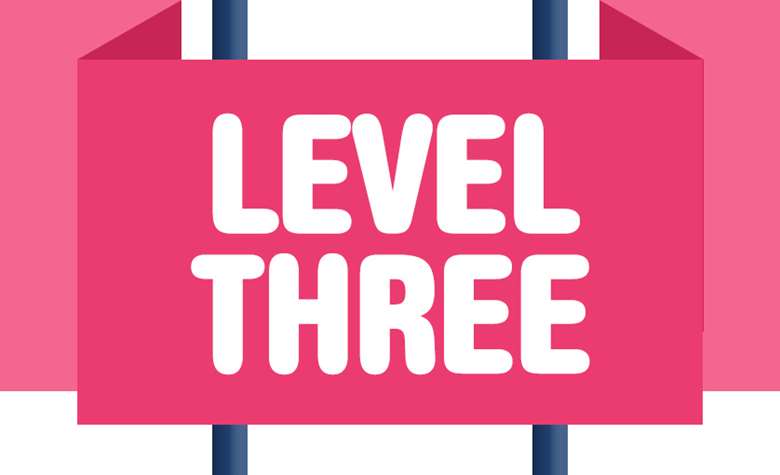Moving ahead
Nursery World
Thursday, June 23, 2022
Level 3 Qualifications in Early Years Education and Childcare

LEVEL 3 RATIOS
In order for a practitioner to count in Level 3 ratios, their qualification must be considered “full and relevant” by the Department for Education. This is deemed as being a qualification which demonstrates depth and level of learning appropriate to specified outcomes of full early years, childcare or playwork qualifications, has valid, reliable assessment and awarding procedures, and includes an element of assessed performance evidence.
Since 2014 “full and relevant” Level 3 qualifications have been badged Early Years Educator (EYE) to show they meet the Early Years Educator criteria, published in July 2013. A full list of “full and relevant” EYE qualifications can be found here.
Staff with a post-September 2014 Level 3 EYE qualification must also hold a suitable Level 2 literacy or numeracy qualification, such as a functional skills qualification or GCSE grade C/ grade 4 or above in order to count in Level 3 ratios.
Staff who completed or registered for a Level 3 qualification before 1 September 2014 must hold a qualification that is on the government’s pre-September 2014 approved list here. These staff do not have to hold Level 2 literacy and numeracy qualifications.
EARLY YEARS EDUCATOR
Level 3 Early Years Educator qualifications are among around 400 fully-funded courses for adults that the Government made available for free from April 2021. The courses are being offered as part of the Government’s Lifetime Skills Guarantee, for adults without a full qualification at Level 3. The list of funded Level 3 courses will be kept under review to ensure that it continues to respond to changing labour market needs.
All full and relevant Level 3 childcare qualifications currently available should clearly state they are ‘Early Years Educator’ qualifications (although for those wanting to work in children’s residential care or children’s social care there are alternatives to the EYE.)
The criteria for all level 3 Early Years Educator qualifications require candidates to demonstrate that they can:
- Support and promote children’s early education and development
- Plan and provide effective care, teaching and learning that enables children to progress and prepares them for school
- Make accurate and productive use of assessment
- Develop effective and informed practice
- Safeguard and promote the health, safety and welfare of children
- Work in partnership with the key person, colleagues, parents and/or carers or other professionals
Early Years Educator qualifications are offered by NCFE CACHE, Pearson; City & Guilds; FutureQuals, IAO, Skillsfirst, BIIAB, TQUK and ICQ.
Playwork
No playwork qualifications at Level 3 carry the Early Years Educator stamp, meaning they will not enable a candidate to count in the level 3 ratios. However candidates may wish to take a playwork qualification alongside a ‘full and relevant’ Level 3. These are particularly appropriate for jobs at after-school or holiday clubs and can enable staff to work with children up to the age of 16.
A variety of providers including NCFE CACHE and City and Guilds offer Level 3 playwork qualifications.
SEND qualification
A level 3 early years special educational needs co-ordinator (SENCO) qualification specification has been developed for the early years sector and is available from NFCE CACHE
The qualification is not mandatory for SENCOs but aims to upskill practitioners.
APPRENTICESHIPS
Apprenticeships are on-the-job learning. Many nursery chains see them as a way of ‘growing their own’ talent by employing people on apprenticeship contracts, training and mentoring them and then offering them a job with the company. Apprenticeships include a qualification at the relevant level, as well as other qualifications such as those in literacy and numeracy. Apprentices must spend 20 per cent of their employment hours in off-the-job training, which can include studying, practical training such as shadowing, and time to write assignments.
The apprenticeship system is moving from a framework to a standards-based model with new rules for funding and assessment. Under the previous system, apprentices were informally assessed on-the-job, but now they must undertake an assessment with an external examiner from an independent company at the end of their course. They can now gain a distinction as well as a simple pass.
A standards-based EARLY YEARS EDUCATOR LEVEL 3 APPRENTICESHIP launched in 2019. The new qualification attracts more funding than its predecessor - up to £6,000 as opposed to around £2,500. As part of the apprenticeship apprentices must successfully complete a Level 3 Early Years Educator qualification from the DfE approved list, and apprentices without Level 2 English and maths need to achieve this before taking their end point assessment. Apprentices must also complete a Level 3 Paediatric First Aid qualification.
For more information on the Level 3 Early Years Educator Apprenticeship, visit the Institute for Apprenticeships & Technical Education: https://www.instituteforapprenticeships.org/apprenticeship-standards/early-years-educator-v1-2. You can find a list of training providers offering the apprenticeship here
T LEVELS
A T-level is a new vocational programme of study at Level 3, and is equivalent to three A-Levels. The Education and Childcare T-Level launched in September 2020. It is expected that T Levels will be fully rolled out to all providers by 2024. Providers currently offering the course can be found here.
Awarding body NCFE CACHE developed the Level 3 Technical Qualification in Education and Childcare which sits within the Education and Childcare T-Level. The T-Level contains a core component’, which covers knowledge and skills that are relevant to all specialisms within the qualification. Students must then choose a specialism from Early Years Educator, Assisting Teaching or Supporting and Mentoring Students in Educational Settings. The Early Years Educator specialism is based on the same standards as the Early Years Educator Level 3 apprenticeship. The curriculum also includes English, maths and digital skills.
A T-Level takes two years to complete and offers students a mixture of classroom learning and “on-the-job” experience during an industry placement of at least 315 hours. Students following the Early Years Education and Childcare occupational specialism will need to complete up to 750 hours in relevant work experience in order to sufficiently meet the Early Years Educator criteria.
The T Level Early Years Education and Childcare pathway meets the Early Years Educator criteria and is listed as full and relevant on the government’s list of qualifications. This means students with an Education and Childcare T-Level, who have taken the Early Years Educator specialism, can be counted in the EYFS staff:child ratios.
The government is positioning T-Levels as one of the main choices for students after GCSEs, alongside apprenticeships for students who wish to learn ‘on the job’ and A-Levels for students who wish to continue academic education.
Employers can receive a £1,000 payment for each new T-Level industry placement that begins before the 31 July 2022, and can claim for up to 20 placements per region. This is a temporary incentive fund designed to offer support to employers impacted by the pandemic, to ensure they can continue to host placements.





